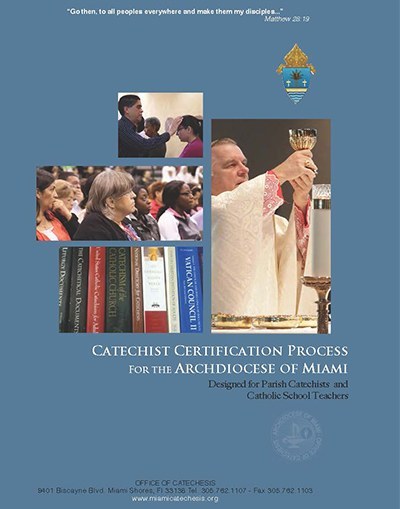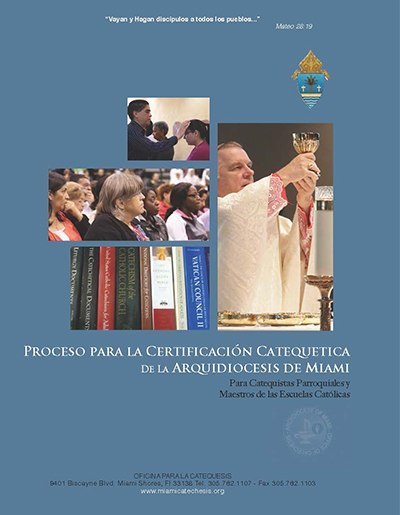By Ana Rodriguez Soto - The Archdiocese of Miami
MIAMI | It has been a requirement for years now: Every school teacher in the Archdiocese of Miami � not just those who teach religion and not just those who are Catholic � must obtain certification as a catechist.Due to a lack of manpower in the Office of Catechesis, that requirement has not been strictly enforced until now, said Peter Ductram, director. But as of now, everyone teaching at the elementary or secondary level in a Catholic school must be certified within the next three years. And that certification must be renewed every five years.
 �It�s essential, I think, that a teacher understands the teaching of the Church,� he said. �They have to understand what are the core and fundamental values of the Church.�
�It�s essential, I think, that a teacher understands the teaching of the Church,� he said. �They have to understand what are the core and fundamental values of the Church.�
How do those relate to history or biology or physical education? In the same way that the history, mission and vision of a corporation such as McDonald�s is part of the training for all its workers, from those who take customers� orders to those flipping burgers in the kitchen.
�We have to build up the Catholic identity,� Ductram said. �The central difference (between) a private school and a Catholic school is our Catholic identity, is an environment where we believe and we act on our Catholic values from the beginning to the end of the year.�
 Those values can determine the prism through which people look at the world: historical events, scientific achievements, literary works, mathematical concepts. The certification courses can help teachers make those connections.
Those values can determine the prism through which people look at the world: historical events, scientific achievements, literary works, mathematical concepts. The certification courses can help teachers make those connections.
�When you have teachers together taking a course on Catholic morality, the discussion is amazing,� said Ductram, adding that he already has experienced it. As teachers share their own understanding or even their own struggles with Church teaching, �the instructor has the tools to clarify some of the teachings and they connect the teachings to their area of expertise.�
In order to be certified, teachers will have to take four 10-hour courses, a reduction from the previous requirement of 12 courses, each lasting 15 hours. The courses focus on: Scripture, the Profession of Faith, Catholic morality, and liturgy and the sacraments. Each course is taught by local Catholics who hold at least a master�s, if not a doctorate, in theology, and have experience as catechists � so their teaching will not remain at the theoretical level but be useful to their peers in the classroom. The professors must be approved by the Office of Catechesis, with Ductram personally interviewing them and observing their classes.
He currently has more than 20 instructors ready to go, and �I have been receiving phone calls from teachers in the high schools that have Ph.D.�s and have a catechetical background. This is an exciting time for me.�
He predicted the certification process would go smoothly. Out of 2,000 Catholic school teachers, about 1,500 have taken at least one course already, and 300 are ready for certification. The Office of Catechesis also will be holding its Summer Institute in all three counties: June 17-21 at St. Brendan High School in Miami; June 24-28 at Archbishop Edward McCarthy High School in Southwest Ranches; and a week and place to be determined in Monroe County.
The Summer Institute can accommodate about 1,100 people at each site, with all the courses taught in English and Spanish. An online option also is available in both languages. Ductram said teachers could complete as many as three of the required courses at the Summer Institute but he recommended they tackle only two because of the amount of reading required.
Courses cost $40 apiece, and much of the reading material is available free online: A study Bible, the Catholic Catechism, the documents of the Second Vatican Council, the U.S. Catechism for Adults, and the National Directory for Catechesis.
Certification can be renewed at the Catechetical Day hosted each fall by the Office of Catechesis. Parishes also can host courses onsite throughout the year. They are simply asked to notify the office before May so that professors can be scheduled to teach them.
The goal is to �ensure that Catholic schools provide a Catholic identity and Catholic environment,� Ductram said. �That doesn�t mean that our schools are not good. They�re excellent. But we need to take this a step forward.�

Booklet explaining the Catechist Certification process. Click on the image to read.
How do those relate to history or biology or physical education? In the same way that the history, mission and vision of a corporation such as McDonald�s is part of the training for all its workers, from those who take customers� orders to those flipping burgers in the kitchen.
�We have to build up the Catholic identity,� Ductram said. �The central difference (between) a private school and a Catholic school is our Catholic identity, is an environment where we believe and we act on our Catholic values from the beginning to the end of the year.�

Este librito explica el proceso de certificacion para catequistas en la Arquidiocesis de Miami. Haga 'clik' en la imagen para leerlo.
�When you have teachers together taking a course on Catholic morality, the discussion is amazing,� said Ductram, adding that he already has experienced it. As teachers share their own understanding or even their own struggles with Church teaching, �the instructor has the tools to clarify some of the teachings and they connect the teachings to their area of expertise.�
In order to be certified, teachers will have to take four 10-hour courses, a reduction from the previous requirement of 12 courses, each lasting 15 hours. The courses focus on: Scripture, the Profession of Faith, Catholic morality, and liturgy and the sacraments. Each course is taught by local Catholics who hold at least a master�s, if not a doctorate, in theology, and have experience as catechists � so their teaching will not remain at the theoretical level but be useful to their peers in the classroom. The professors must be approved by the Office of Catechesis, with Ductram personally interviewing them and observing their classes.
He currently has more than 20 instructors ready to go, and �I have been receiving phone calls from teachers in the high schools that have Ph.D.�s and have a catechetical background. This is an exciting time for me.�
He predicted the certification process would go smoothly. Out of 2,000 Catholic school teachers, about 1,500 have taken at least one course already, and 300 are ready for certification. The Office of Catechesis also will be holding its Summer Institute in all three counties: June 17-21 at St. Brendan High School in Miami; June 24-28 at Archbishop Edward McCarthy High School in Southwest Ranches; and a week and place to be determined in Monroe County.
The Summer Institute can accommodate about 1,100 people at each site, with all the courses taught in English and Spanish. An online option also is available in both languages. Ductram said teachers could complete as many as three of the required courses at the Summer Institute but he recommended they tackle only two because of the amount of reading required.
Courses cost $40 apiece, and much of the reading material is available free online: A study Bible, the Catholic Catechism, the documents of the Second Vatican Council, the U.S. Catechism for Adults, and the National Directory for Catechesis.
Certification can be renewed at the Catechetical Day hosted each fall by the Office of Catechesis. Parishes also can host courses onsite throughout the year. They are simply asked to notify the office before May so that professors can be scheduled to teach them.
The goal is to �ensure that Catholic schools provide a Catholic identity and Catholic environment,� Ductram said. �That doesn�t mean that our schools are not good. They�re excellent. But we need to take this a step forward.�


Comments from readers